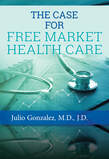The Federalist Pages is presently featuring a number of articles. Please make sure to scroll down to read each of our insightful pieces.

The COVID Rebellion Begins
by
Julio Gonzalez, M.D., J.D.
Many have wondered how long it would take. When, they asked, would the country say enough is enough and lash out at the federal government's and the oppressive states' dictatorial COVID19 policies? Mark your calendars. That day was March 2, 2021.
There have indeed been signs of increasing unrest. Florida has been a beacon, lighting the path to a post-COVID world. Since Governor Ron DeSantis's decision to completely lift his state's COVID restrictions, Florida has been the quintessential example, pointing out the foolhardiness of mask mandates and business restrictions. Anytime a pro-emergency powers advocate claims restrictions must be continued, Florida is brought up as the real-time example against which there is no real retort. Joining Florida have been other, less populous states like North Dakota, Montana and Iowa.
The rumble of dissatisfaction from individuals and business has been growing as well.
Dr. Julio Gonzalez is an orthopaedic surgeon and lawyer living in Venice, Florida. He served in the Florida House of Representatives. He is the author of numerous books including The Federalist Pages, The Case for Free Market Healthcare, and Coronalessons. He is available for appearances and book signings, and can be reached through www.thefederalistpages.com.
by
Julio Gonzalez, M.D., J.D.
Many have wondered how long it would take. When, they asked, would the country say enough is enough and lash out at the federal government's and the oppressive states' dictatorial COVID19 policies? Mark your calendars. That day was March 2, 2021.
There have indeed been signs of increasing unrest. Florida has been a beacon, lighting the path to a post-COVID world. Since Governor Ron DeSantis's decision to completely lift his state's COVID restrictions, Florida has been the quintessential example, pointing out the foolhardiness of mask mandates and business restrictions. Anytime a pro-emergency powers advocate claims restrictions must be continued, Florida is brought up as the real-time example against which there is no real retort. Joining Florida have been other, less populous states like North Dakota, Montana and Iowa.
The rumble of dissatisfaction from individuals and business has been growing as well.
Dr. Julio Gonzalez is an orthopaedic surgeon and lawyer living in Venice, Florida. He served in the Florida House of Representatives. He is the author of numerous books including The Federalist Pages, The Case for Free Market Healthcare, and Coronalessons. He is available for appearances and book signings, and can be reached through www.thefederalistpages.com.